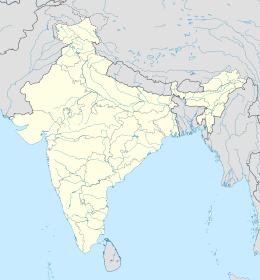| Jalpaiguri | |||||
|---|---|---|---|---|---|
| Indian Railways station | |||||
 | |||||
| General information | |||||
| Location | Station Feeder Road, Jalpaiguri, West Bengal, PIN 735 101 India | ||||
| Coordinates | 26°31′08″N 88°43′25″E / 26.5189°N 88.7237°E / 26.5189; 88.7237 | ||||
| Elevation | 84 metres (276 ft) | ||||
| Owned by | Indian Railways | ||||
| Operated by | Northeast Frontier Railway | ||||
| Line(s) | Haldibari–New Jalpaiguri line | ||||
| Platforms | 3 | ||||
| Tracks | 4, 2 on Platform, 2 Loop lines, however line 4(goods) is not connected to others at the RQJ end | ||||
| Construction | |||||
| Structure type | Standard on ground | ||||
| Parking | Available | ||||
| Other information | |||||
| Status | Functioning | ||||
| Station code | JPG | ||||
| Zone(s) | NFR | ||||
| Division(s) | Katihar | ||||
| History | |||||
| Opened | 1878 | ||||
| Electrified | Yes | ||||
| Previous names | Bengal Assam Railway | ||||
| |||||
Jalpaiguri railway station serves Jalpaiguri city in Jalpaiguri district in the Indian state of West Bengal.
History
During the British period, all connections from southern parts of Bengal to North Bengal were through the eastern part of Bengal. From 1878, the railway route from Kolkata, then called Calcutta, was in two laps. The first lap was a 185 km journey along the Eastern Bengal State Railway from Calcutta Station (later renamed Sealdah) to Damookdeah Ghat on the southern bank of the Padma River, then across the river in a ferry and the second lap of the journey. A 336 km metre-gauge line of the North Bengal Railway linked Saraghat on the northern bank of the Padma to Siliguri via Jalpaiguri.
The 1.8 km-long Hardinge Bridge across the Padma came up in 1912. In 1926 the metre-gauge section north of the bridge was converted to broad gauge, so the entire Calcutta–Siliguri route became broad gauge. The route thus ran: Sealdah–Ranaghat–Bheramara–Hardinge Bridge–Iswardi–Santahar–Hili–Parabtipur–Nilphamari–Haldibari-Jalpaiguri-Siliguri.
With the partition of India, this track got trisected. The through route was formally closed after the India–Pakistan War in 1965.
The Siliguri–Haldibari, part of the original broad gauge Calcutta–Siliguri track via Hardinge Bridge, got delinked from the trunk route in 1947. As all the other tracks in the area were metre gauge, it was converted from broad gauge to metre gauge in the late forties. When New Jalpaiguri railway station came up, the line was extended to New Jalpaiguri. When broad-gauge lines were laid in the area, it was reconverted to broad gauge and now functions as the Haldibari–New Jalpaiguri line.
See also: Darjeeling MailAmenities
Jalpaiguri railway station has the following amenities: computerized reservation center, waiting rooms, retiring rooms, book stall and food stall.
References
- ^ "India: the complex history of the junctions at Siliguri and New Jalpaiguri". IRFCA. Retrieved 4 March 2013.
- "New rail transit route thru India gets govt nod". Priyo Internet Life. Archived from the original on 8 June 2013. Retrieved 4 March 2013.
External links
- Departures from Jalpaiguri railway station
 Jalpaiguri travel guide from Wikivoyage
Jalpaiguri travel guide from Wikivoyage
| Preceding station | Following station | |||
|---|---|---|---|---|
| Kadobaritowards ? | Northeast Frontier Railway zoneHaldibari–New Jalpaiguri line | Mohitnagar Jalpaiguritowards ? | ||
| Jalpaiguri district topics | |||||||
|---|---|---|---|---|---|---|---|
| General |
| ||||||
| Municipal corporations | |||||||
| Municipalities | |||||||
| Community development blocks |
| ||||||
| Rivers | |||||||
| Transport | |||||||
| Railway stations | |||||||
| Institutes of higher learning | |||||||
| Lok Sabha constituencies | |||||||
| Vidhan Sabha constituencies | |||||||
| Former Vidhan Sabha constituencies | |||||||
| See also | |||||||

